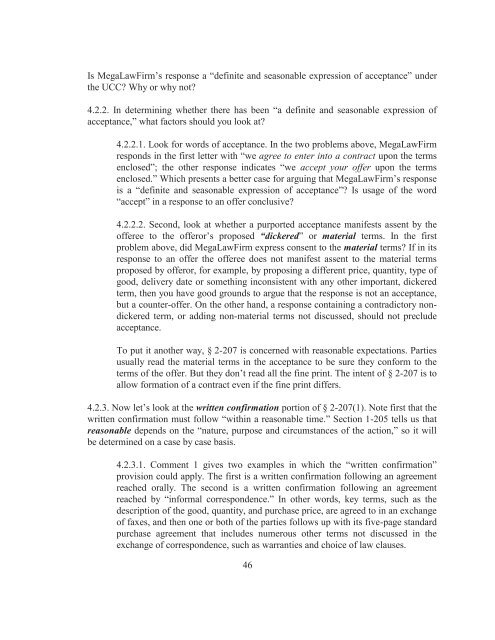Sales and Leases - A Problem-based Approach, 2016a
Sales and Leases - A Problem-based Approach, 2016a
Sales and Leases - A Problem-based Approach, 2016a
You also want an ePaper? Increase the reach of your titles
YUMPU automatically turns print PDFs into web optimized ePapers that Google loves.
Is MegaLawFirm’s response a “definite <strong>and</strong> seasonable expression of acceptance” under<br />
the UCC? Why or why not?<br />
4.2.2. In determining whether there has been “a definite <strong>and</strong> seasonable expression of<br />
acceptance,” what factors should you look at?<br />
4.2.2.1. Look for words of acceptance. In the two problems above, MegaLawFirm<br />
responds in the first letter with “we agree to enter into a contract upon the terms<br />
enclosed”; the other response indicates “we accept your offer upon the terms<br />
enclosed.” Which presents a better case for arguing that MegaLawFirm’s response<br />
is a “definite <strong>and</strong> seasonable expression of acceptance”? Is usage of the word<br />
“accept” in a response to an offer conclusive?<br />
4.2.2.2. Second, look at whether a purported acceptance manifests assent by the<br />
offeree to the offeror’s proposed “dickered” or material terms. In the first<br />
problem above, did MegaLawFirm express consent to the material terms? If in its<br />
response to an offer the offeree does not manifest assent to the material terms<br />
proposed by offeror, for example, by proposing a different price, quantity, type of<br />
good, delivery date or something inconsistent with any other important, dickered<br />
term, then you have good grounds to argue that the response is not an acceptance,<br />
but a counter-offer. On the other h<strong>and</strong>, a response containing a contradictory nondickered<br />
term, or adding non-material terms not discussed, should not preclude<br />
acceptance.<br />
To put it another way, § 2-207 is concerned with reasonable expectations. Parties<br />
usually read the material terms in the acceptance to be sure they conform to the<br />
terms of the offer. But they don’t read all the fine print. The intent of § 2-207 is to<br />
allow formation of a contract even if the fine print differs.<br />
4.2.3. Now let’s look at the written confirmation portion of § 2-207(1). Note first that the<br />
written confirmation must follow “within a reasonable time.” Section 1-205 tells us that<br />
reasonable depends on the “nature, purpose <strong>and</strong> circumstances of the action,” so it will<br />
be determined on a case by case basis.<br />
4.2.3.1. Comment 1 gives two examples in which the “written confirmation”<br />
provision could apply. The first is a written confirmation following an agreement<br />
reached orally. The second is a written confirmation following an agreement<br />
reached by “informal correspondence.” In other words, key terms, such as the<br />
description of the good, quantity, <strong>and</strong> purchase price, are agreed to in an exchange<br />
of faxes, <strong>and</strong> then one or both of the parties follows up with its five-page st<strong>and</strong>ard<br />
purchase agreement that includes numerous other terms not discussed in the<br />
exchange of correspondence, such as warranties <strong>and</strong> choice of law clauses.<br />
46


















